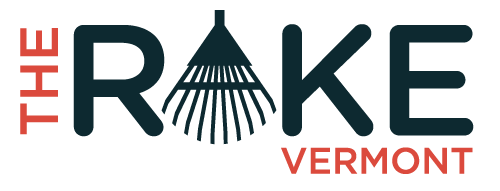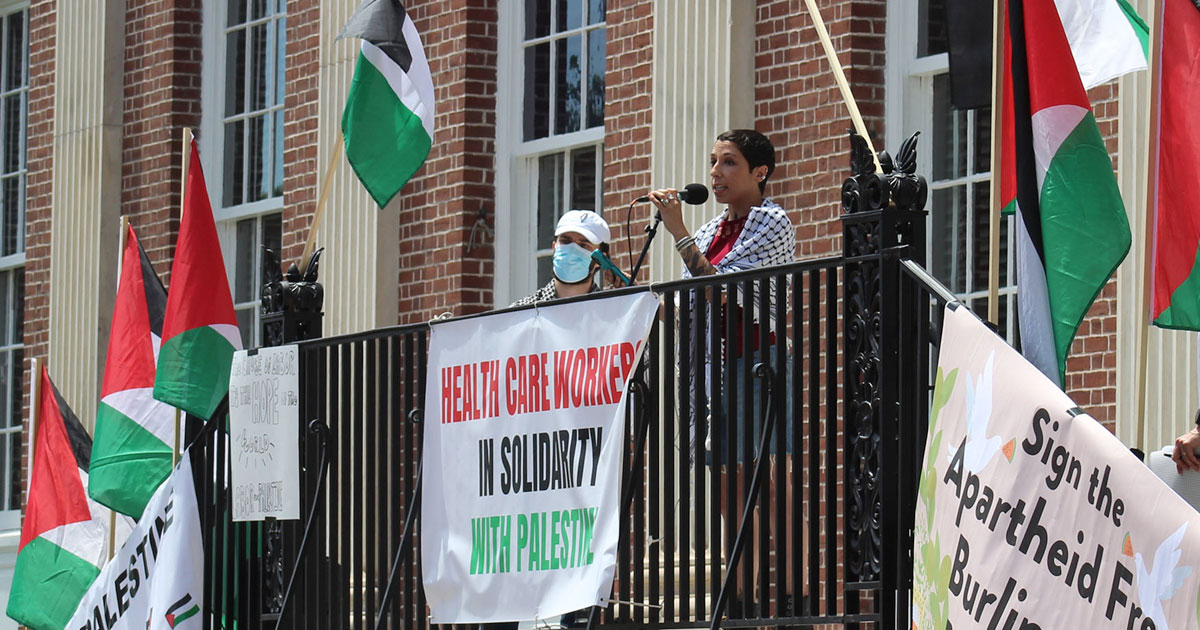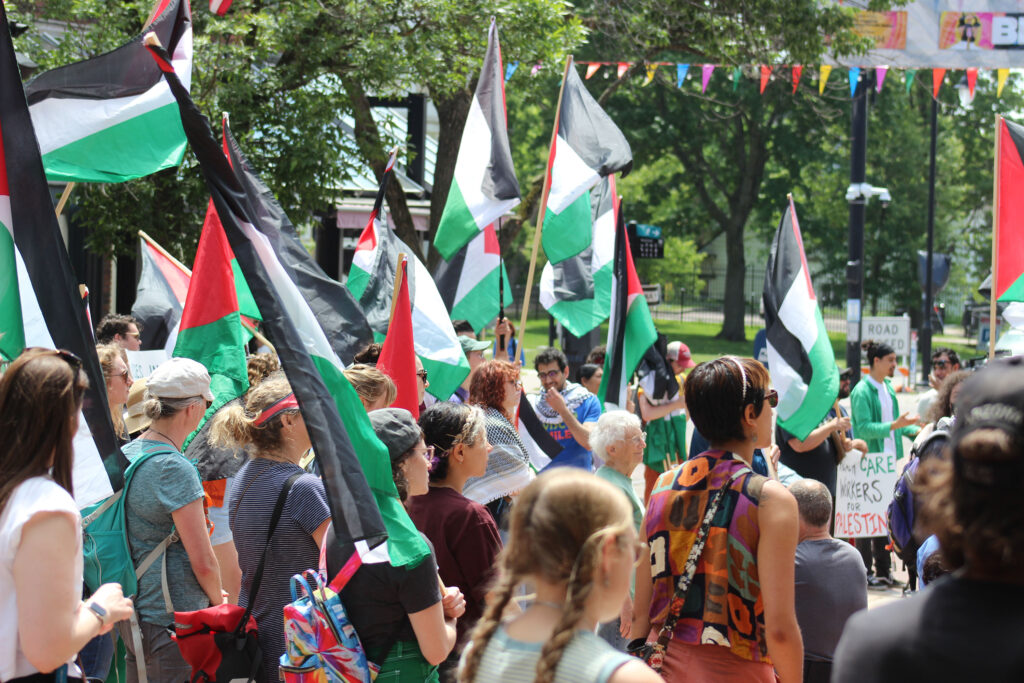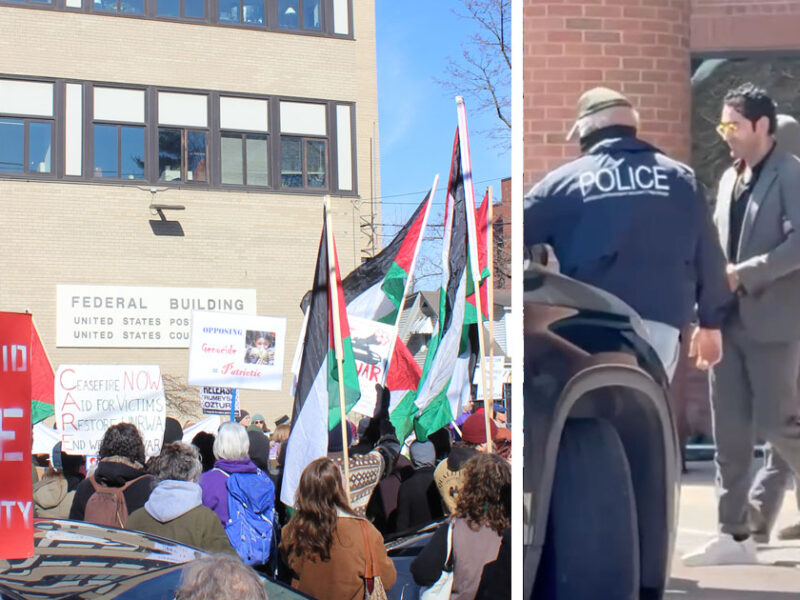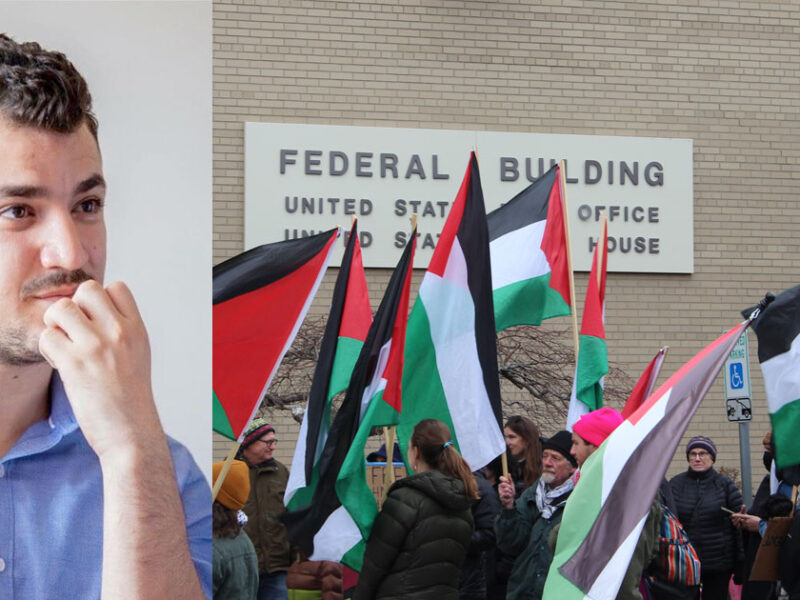The official death toll in Gaza has now topped 36,000. Experts believe that given the lack of medical and civil infrastructure for reliable reporting of deaths, especially those that occur outside of hospitals, the actual death toll so far is much, much higher.
More than one hundred people gathered around Burlington City Hall Sunday to highlight the humanitarian crisis unfolding as Israel’s genocidal war in Gaza nears its eighth month. Held by Vermont Healthcare Workers for Palestine, several speakers who work in medicine described the decimation of the healthcare system in Gaza, its effects on both Gazans and medical practitioners, and the practical actions that Vermonters can take to make a difference.
Samia, a Palestinian and mental health worker who lives in southern Vermont, said, “What does health look like in Gaza today? We could ask: what is health in the face of genocide? What is care in the context of occupation and systemic annihilation?”
“So let us speak the truth today. Zionism is a health crisis. Settler colonialism is a health crisis. Racism is a health crisis. Occupation is a health crisis. Apartheid is a health crisis. Genocide is a health crisis,” Samia said.
The charity Save the Children reports, “Over 1.9 million people in Gaza have been forced from their homes. Many of them are seeking refuge in UN shelters, schools, hospitals, camps, with relatives and friends, and other civilian sites. Thousands have been killed or injured in these places and they face hunger, thirst and disease.” Without clean water, access to which was shut off by the Israeli government in early October, waterborne illnesses are now commonplace across Gaza, exacerbated by the lack of sanitation infrastructure in both urban areas and the tent encampments hastily constructed each time the Israeli military demands another civilian displacement.
The international aid group Doctors Without Borders recently published a timeline of attacks their healthcare workers and facilities in Gaza have suffered since October 7. They remarked on the uniquely deadly circumstances they face: “the increasing disrespect and disregard of medical humanitarian action and the destruction of health facilities and staff shelters, along with the killing of colleagues and patients, made it nearly impossible for MSF to negotiate the protection we usually seek in conflict settings.”
On May 30, the World Health Organization announced that the last functioning hospital in Rafah, Al-Helal Al-Emirati, has gone “out of service,” which follows the shuttering of the other two primary hospitals in the area on May 7th and 28th.
Dr. Amalia Kane, a family medicine doctor at UVM Medical Center, said to the assembled crowd, “In the face of deliberate attacks on health care, we cannot remain silent. In the words of Desmond Tutu, ‘if you are neutral in situations of injustice, you have chosen the side of the oppressor.’” Kane, a new mother herself, remarked on the impossible situation parents in Gaza are facing. “A malnourished new mother cannot produce milk to breastfeed. Without formula and clean water, infants are starting their lives starving. This harm will have long-lasting effects.”
Speaking out in defense of Palestinians can carry serious professional risks, including for healthcare workers. Just last month, Palestinian-American nurse Hesen Jabr was fired from her job at NYU Langone after mentioning Gaza in an award acceptance speech. She had received the institution’s Sebastian Brun Compassionate Care Award for her work supporting grieving mothers. In her speech, she said, “It pains me to see the women from my country going through unimaginable losses themselves during the current genocide in Gaza.”
Kate, a nursing student and member of Jewish Voice for Peace, said, “I organize with JVP in support of the liberation of Palestine and against Zionism because as a Jewish person, my conscience and my ancestors compel me to… As a former emergency tech and EMT, I watch in horror as Israeli bombs obliterate hospitals, murdering healthcare workers and their patients trying to heal and shelter inside. I cannot imagine the fear of Gazan nurses as Israeli soldiers storm their ICUs. I am in awe of the Gazan doctors’ bravery to perform life-saving procedures, c-sections, amputations on patients without necessary medication.”
Hospital workers in Gaza are not just missing vital medication like local and general anesthesia and painkillers. Even basic sterilization and clean, sharp scalpels are unavailable. And because nearly all patients are malnourished, even minor wounds are unable to heal, causing widespread and deadly infections among patients.
CNN reported that when the rare aid truck with medicine is allowed to enter Gaza, the Israeli government bars much of what’s most desperately needed: “These include anesthetics and anesthesia machines, oxygen cylinders, ventilators and water filtration systems. Other items that have ended up in bureaucratic limbo include dates, sleeping bags, medicines to treat cancer, water purification tablets and maternity kits.”
How Vermonters are Taking Action
In addition to local rallies, Vermont Healthcare Workers for Palestine and coalition partners are gathering signatures for an Apartheid-Free Community resolution that would appear before Burlington’s voters next March. Last year, a similar resolution was denied placement on the ballot by a city council vote despite having gathered more than enough signatures to meet the threshold for inclusion.
Vermonters are also encouraged to attend a national protest at the White House in Washington, DC, this Saturday, June 8th, and to have their local unions, churches, and other groups sign Apartheid-Free Community statements.
Heather Bauman, who works at UVM Medical Center and is president of UVMMC Support Staff United, connected the solidarity felt between her co-workers and the solidarity they feel with those fighting to survive and save lives in Gaza.
“We have an obligation to keep each other safe. We have an obligation to keep our hospital community safe. We have an obligation to Burlington, Chittenden County, and Vermont. But we also have obligations that extend out to folks around the world who not only need our help, but are asking for it,” she said, referring to the call to action issued by the Palestine General Federation of Trade Unions late last year.
Bauman also noted that there is much organizing work to be done within the larger union of which her local is a member. “Our local is getting ready to pass a resolution to take to the national convention to ask [American Federation of Teachers] national to divest. They own an Israel bond. We need to divest now,” she said.
Patrick is a writer and organizer based in northern Vermont. He is on the editorial collective for The Rake Vermont.
